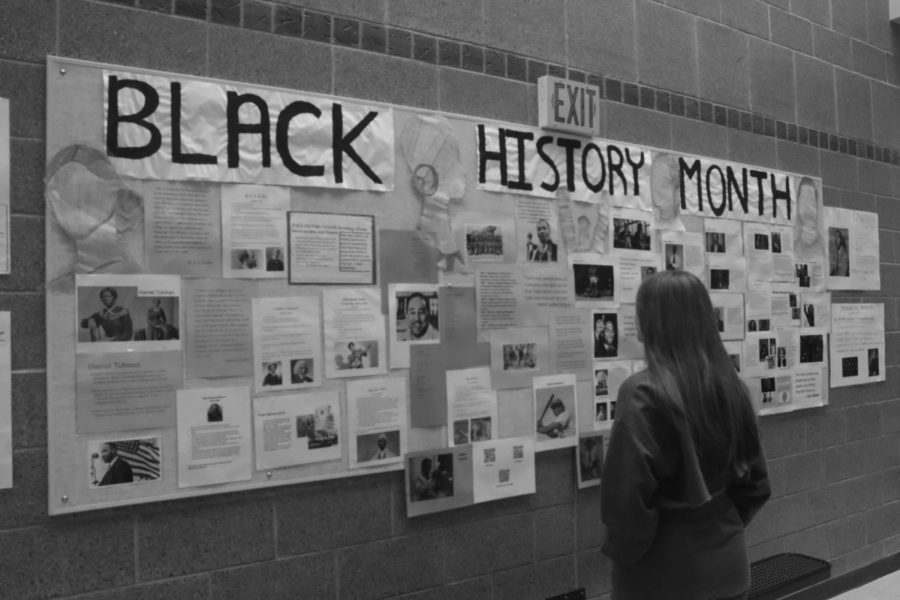Black history in the classroom
The importance of Black History in the classroom and why we need to know more
Stopping at the display outside the library, senior Ally Fortney observes the Black History wall created by the Justice and Diversity League. Throughout the month of January, the group of students did plenty of research to get as many prominent African American leaders on the wall as possible. “Even though this display has been up every year since my freshman year, this was really the first time I really took the time to read through it,” Fortney said. “I really wish more people did so because I know there is so much history and we don’t always have the time or resources to cover all of it during structured class time.”
February 9, 2023
As February approaches, people all over the United States come together to celebrate Black History. Some choose to support local black owned businesses, donate to organizations and attend Black History events, while others choose to educate themselves and emphasize the rich history of African American culture. At Millard West, members of the Justice and Diversity League created a display outside of the library showing a range of key figures throughout all aspects of society. However, the sad truth is that so many students pass by everyday without even giving it a second thought.
Black History was first honored in 1926 through ‘Negro History Week’ by Carter Woodson. He chose a week in February because both Abraham Lincoln and Frederick Douglas’s birthdays fall within the month, and both left a lasting impact on the black community. Woodson hoped that Americans would use the week to teach about the past in order for race to continue to be prominent in American society and for African Americans to gain proper representation.
Many years later in 1976, Black History was officially recognized for the entire month of February by President Gerald Ford who told Americans to “seize the opportunity to honor the too-often neglected accomplishments of Black Americans in every endeavor throughout our history.”
Today, Black History Month is a time where we honor the contributions and legacy of African Americans across the country. Although that is exactly what the Justice and Diversity display is accomplishing, the display alone is simply not enough.
We should be educating ourselves about Black History year round, and not just during the shortest month of the year. Not only that, but it should also be better incorporated into the classroom curriculum.
There are so many different ways to do so and we can start with the basics of simply being able to talk openly about race as much as possible in order to help students feel more comfortable in discussion. Books are another great way to prompt discussion that doesn’t always come naturally. Even somewhat outdated books offer opportunities for students to ask questions and think critically about racial influence.
Our nation’s present problems with race and intolerance make no sense if we don’t take a step back and examine the history behind it. We are living in a country that was built on the backs of slavery and although the 13th Amendment abolished slavery nearly 157 years ago, African Americans are still reaping the consequences. Whether you are looking at the rise of white supremacy movements, or efforts to remove Confederate monuments, the effects are very prevalent to this day.
However, with that being said it is important to acknowledge how far our country has come by honoring activists and civil rights pioneers such as Harriet Tubman, Marcus Garvey, Martin Luther King Jr., Malcolm X, Rosa Parks, and leaders in industry, politics, science, culture and more. We can also follow current events, and study artwork and music that brings attention to those who fall victims to the systemic racism and racial injustice in the United States.
Moving forward our entire focus on Black History in the classroom should not just be about slavery and oppression, but about the enormous impact Black culture continues to have on this country. Although those aspects are a huge part of our country’s history, they don’t cover the cultural durability and success of African Americans. It is important that we also cover their unique contributions to art, literature, music, sports, and businesses.
Even in predominantly white schools, such as Millard West, students know and understand that race is among one of the biggest issues in our country, and by not acknowledging that, the racism continues. If we actually start to bring more attention to these issues and honor Black History year round we can provide a place where students of color in our school feel noticed and represented within our education. With a better understanding of somewhat uncomfortable topics we can form a more compassionate tomorrow.







